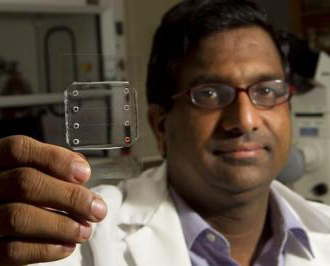Anubhav Tripathi Creates Flu-Diagnosis Biochip
By wchung | 04 Feb, 2026
Anubhav Tripathi's biochip will enable fully portable diagnosis of the precise strains of diseases.
Brown University researcher Anubhav Tripathi has developed a simple method for amplifying target strands of RNA to enable fully portable diagnosis of the precise strain of flu virus infecting a patient.
Current methods for diagnosing a strain of flu requires amplification of a sample’s genetic material through either a polymerase chain reaction (PCR), which replicates DNA, or a nucleic acid sequence-based amplification, which copies the single-stranded RNA. Both processes take hours at precise temperatures and other conditions that limit the process to labs.
Tripathi’s biochip probe is the size of a credit card and can amplify RNA without the need to control temperatures. The biochip marks target stretches of RNA with 2.8-micro magnetic beads. Then, using magnets, the strands are then drawn through a channel that narrows to 50 microns, separating them from the unattached strands.
“In each disease, there is a specific sequence which identifies that RNA,” says Tripathi, co-director of Brown’s Center for Biomedical Engineering. “We attack that sequence.”
The isolated target strands can be replicated within minutes on a handheld device. Tripathi named this test on a biochip SMART for “Simple Method for Amplifying RNA Targets.” The chip is essentially a series of very thin tubes extched like channels into the biochip with bulbs on the end of each. The device solves a problem that has occupied researchers for at least a decade.
“It’s a low-cost device for active, on-site detection, whether it’s influenza, HIV, or TB (tuberculosis),” he says.
“With our method, we don’t want to amplify RNA or converted DNA,” says Tripathi. “We want to amplify our own probe, which is very short—just 25 to 26 nucleotides.”
“This is the kind of test that could tell you you’re dealing with something new and unexpected,” says study contributor Andrew Artenstein, a Brown professor and director of the Center for Biodefense and Emerging Pathogens at Memorial Hospital of Rhode Island.
Tripathi has so far focused his work on the influenza virus, including swine flu. He now hopes to raise additional funds to apply SMART to HIV samples collected from a hospital in Kenya. A simple process of detecting HIV already exists, but Tripathi’s biochip could be used to measure the HIV’s viral load to give a quick indication of the patient’s degree of illness and effectiveness of treatment.
Tripathi’s team is also working on technologies for detecting biohazards.
Tripathi received his bachelors degree in engineering in 1991 from the Indian Institute of Technology in Kanpur, followed by a masters there in 1993. He received a PhD in chemical engineering from the City University of New York in 1998. He worked as a research scientist at Caliper LifeSciences and founded Gauge Microfluidics while teaching and conducting research at Brown University.

Brown University researcher Anubhav Tripathi has developed a breakthrough in the portable diagnosis of the specific strains of viral strains.
Asian American Success Stories
- The 130 Most Inspiring Asian Americans of All Time
- 12 Most Brilliant Asian Americans
- Greatest Asian American War Heroes
- Asian American Digital Pioneers
- New Asian American Imagemakers
- Asian American Innovators
- The 20 Most Inspiring Asian Sports Stars
- 5 Most Daring Asian Americans
- Surprising Superstars
- TV’s Hottest Asians
- 100 Greatest Asian American Entrepreneurs
- Asian American Wonder Women
- Greatest Asian American Rags-to-Riches Stories
- Notable Asian American Professionals

